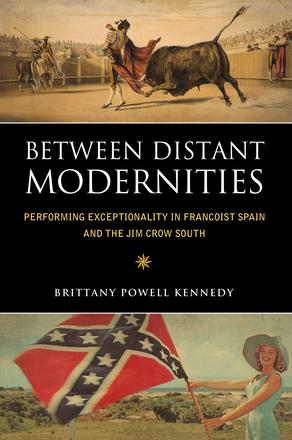
Between Distant Modernities
Performing Exceptionality in Francoist Spain and the Jim Crow South
A literary exploration of the surprising similarities between the US South and Franco’s Spain
Description
For centuries, Spain and the South have stood out as the exceptional "other" within US and European nationalisms. During Franco's regime and the Jim Crow era both violently asserted a haunting brand of national "selfhood. " Both areas shared a loss of splendor and a fraught relation with modernization, and they retained a sense of defeat. Brittany Powell Kennedy explores this paradox not simply to compare two apparently similar cultures but to reveal how we construct difference around this self/other dichotomy. She charts a transatlantic link between two cultures whose performances of "otherness" as assertions of "selfhood" enact and subvert their claims to exceptionality. Perhaps the greatest example of this transatlantic link remains the War of 1898, when the South tried to extract itself from but was implicated in US imperial expansion and nation-building. Simultaneously, the South participated in the end of Spain as an imperial power.
Given the War of 1898 as a climactic moment, Kennedy explores the writings of those who come directly after this period and who attempted to "regenerate" what was perceived as "traditional" in an agrarian past. That desire recurs over the century in novels from writers as diverse as William Faulkner, Camilo José Cela, Walker Percy, Eudora Welty, Federico García Lorca, and Ralph Ellison. As these writers wrestle with ideas of Spain and the South, they also engage questions of how national identity is affirmed and contested.
Kennedy compares these cultures across the twentieth century to show the ways in which they express national authenticity. Thus she explores not only Francoism and Jim Crow, but varied attempts to define nationhood via exceptionalism, suggesting a model of performativity that relates to other "exceptional" geographies.
Reviews
"Between Distant Modernities opens up exciting possibilities for future research, particularly into the regional and linguistic groups within the South and Spain. Moreover, as Kennedy makes clear from the outset, exceptionality does not end with Jim Crow or Francoism: the continued divisions within both Spain and the South—including the continued independence movements in the Basque Country, Catalonia, and Galicia—suggest the ongoing applications of Kennedy’s study of modern nationalisms. In beginning these and many other conversations, Between Distant Modernities is an important contribution to transatlantic performance studies, Hispanic studies, and the new Southern studies."
- Emily Robins Sharpe, ALH Online Review
"This study uses Benedict Anderson’s concept of imagined communities to think about 'nationhood as a performed entity.' Using the Spanish-American War as a critical turning point, Kennedy argues that new models of nationhood are formed in reaction to a “perceived loss of national authenticity,” such as Spain’s perception of its waning colonial strength and the way in which US Southerners, remembering Civil War defeat, used the 1898 war to align with a successful military action."
- American Literature
"Between Distant Modernities is an original and most timely addition to the discourse on modernity. Comparing attitudes prevalent in two apparently unrelated cultural enclaves, Brittany Kennedy opens up an entirely new area of discussion. This is a provocative, highly intelligent, and compelling study that will certainly be required reading for scholars of cultural history on both sides of the Atlantic."
- C. Christopher Soufas Jr., Temple University